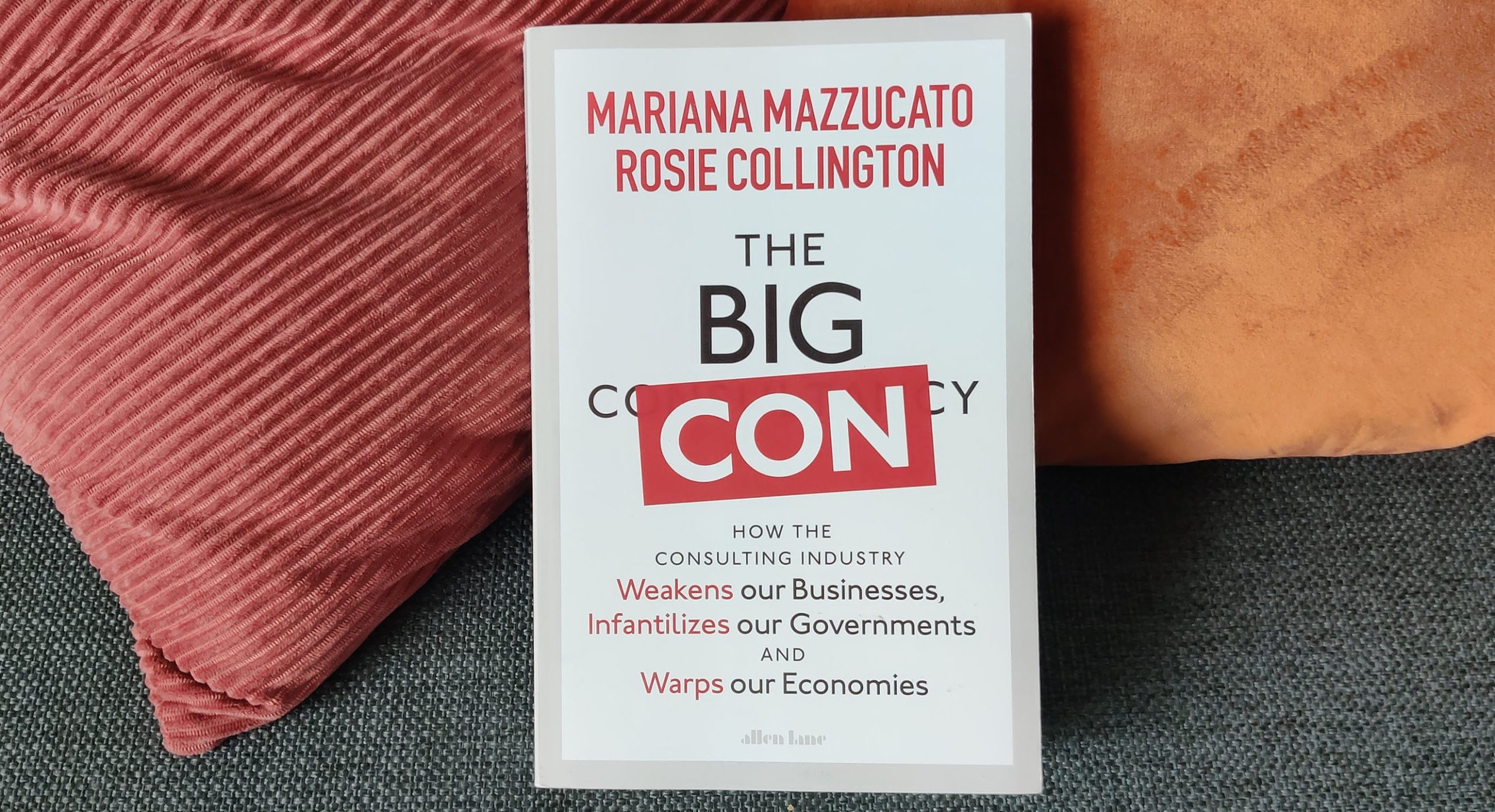When the Australian government set out to develop its plans for reaching net zero emissions by 2050, it contracted consultancy McKinsey to issue a Long-Term Emissions Reduction Plan, even though Australia’s own national science agency, CSIRO, is sufficiently qualified to do so. McKinsey’s models were met with widespread criticism and resistance because of flaky assumptions and because they fell at least 15% short of a full emissions reduction by 2050. As such, the consultancy did not offer the value it claims to be uniquely qualified to deliver, unless the goal of the AUD$6 million contract was not to reduce emissions in the first place, but rather to protect Australia’s many carbon-intensive industries, almost all of which are also McKinsey clients.
This anecdote is just one of the many examples that Mazzucato and Collington provide in The Big Con: How the Consultancy Weakens our Businesses, Infantilizes our Governments and Warps our Economies. By drawing on climate change action cases, the development of the Medicare platform, government response to the COVID-19 pandemic, policies to limit the fallout of the 2008 financial crisis, the 2016 bankruptcy proceedings of Puerto Rico, and the demise of Valeant Pharmaceuticals, among others, they demonstrate how the consultancy industry pulls off a confidence trick over hollowed-out and timid governments on the one hand, and shareholder maximizing firms on the other.
Of course, consultancy is not the root cause for these crises, societal challenges, or even their solutions, but a side-effect of current capitalism. Mazzucato and Collington convincingly argue that neoliberal thinking did not lead to the intended reduction of public sector spending, nor did neoliberal policies drive significant private sector growth. Instead, the New Public Management approach that underpinned government policies over the last three decades primarily resulted in a redirection of state spending as a means of transferring greater responsibility for producing goods and services to the private sector.
As it turns out, the consultancy industry played a unique and successful role in shaping and simultaneously benefitting from market-driven economics and politics. In doing so, they accrued rewards as rents that far outweigh the value of their contributions to organizations, the economy, and society. Dubbed ‘consultocracy’ by Hood and Jackson, the consultancy industry is a self-serving movement designed to promote the career interests of an elite group of new managerialists and a vehicle for particularist advantage.
The dominant theory supporting the widespread existence of consultancy claims that they create economies of scale in managerial, sectoral, or technical knowledge. Consequently, the size and scope of the industry is a direct result of its added value to the economy. Mazzucato and Collington, however, assert that consultancy’s productive contribution is far more modest than their market value would suggest because of the ‘Big Con’: the idea that consultants are impression managers, predominantly creating a perception of value.
The authors convincingly substantiate their position by exploring the origins of the consulting industry in the late 19th century, the myriad of reasons why organisations and companies engage consultants, the rationale for well-meaning people to join consultancies, and how the consultancy business model at its core contains a skewed reward-risk relationship with clients. In doing so, they uncover the threat that overreliance on consultancy poses to organisations: the less an organisation does something, the less it knows how to do it. Correspondingly, short-term gain is traded for long-term capability and underperformance.
As adequately shown by the case of Valeant Pharmaceuticals in The Big Con, consultancies provide a view that knowledge and capability can be purchased off the shelf. However, expertise and organisational capability are not just means of achieving current goals and objectives, but also building blocks and resources for future capacity. By relying on outside know-how, companies and government forgo the opportunity to learn and build in-house capabilities, straining future resilience and adaptability.
As with Mazzucato’s other books, The Big Con is equal parts qualitative research and activist in nature. The analysis presented in the book is so troubling and backed up with an abundance of disturbing examples that it effectively appeals to the reader’s sense of justice. Mazzucato and Collington offer a glimpse into an industry that not many people instinctively see as posing an economic or societal problem. In doing so, they provide a unique and valuable insight into the worrisome effects of consultancy on government functioning, public policies, and public sector capability.

Leave a Reply